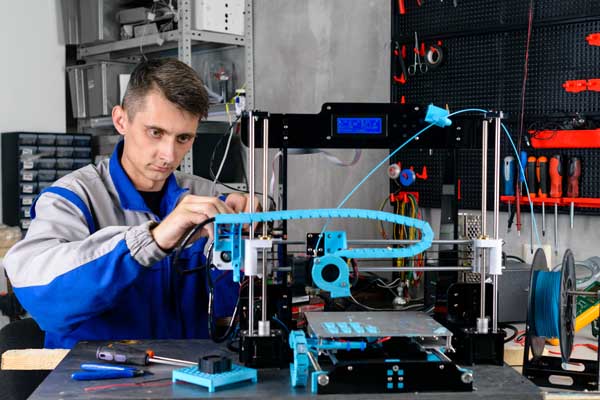The manufacturing sector is a vital part of Canada’s economy, accounting for about 10% of Canada’s GDP. Manufacturing is highly innovative, relying on cutting-edge technologies and a skilled workforce. As the world changes, manufacturers are well-positioned to take advantage of new opportunities and continue to grow.
Canadian manufacturers export a significant amount of goods each year, contributing substantially to the Canadian economy. The manufacturing sector provides quality full-time jobs for Canadians all across the country. To ensure that Canada’s manufacturing industry continues to thrive, investment in research and development is needed, along with supporting the adoption of new technologies and providing training for the workforce of the future. With the right policies in place, Canada’s manufacturing sector will continue to be a key driver of the economy.
Canadian manufacturing includes aerospace and defense, automotive, life sciences and biomanufacturing, chemicals, hydrogen and fuel cells, medical devices, plastics, primary metals, rubber, shipbuilding and industrial marine, and textiles. Some sub-sectors are currently doing better than others. There are a number of areas where Canada excels, including aerospace, automotive, and medical device manufacturing.
In general, Canadian manufacturers have to contend with higher labor costs and a weaker currency than their US counterparts. This can make it more challenging to compete in certain sectors. However, the combination of a highly skilled workforce and strong infrastructure has helped many Canadian companies thrive in the global marketplace.
According to Statistica, manufacturing employs more than 1.74 million workers, and industrial work makes up 19% of Canada’s jobs.
Jobs in manufacturing include:
- Plant Operations Management
- Production Management
- Engineering such as Chemical, Electrical, Industrial, and Mechanical
- Skilled trades such as electricians, welders, forklift operators, millwrights, and machinists
- Procurement
- Assembly and Packaging
- Quality Assurance
- Shipping and Receiving
Investing in a strong manufacturing workforce is crucial to maintaining an efficient operation. By ensuring that the manufacturing company is fully staffed and has the most experienced and capable workers, owners can help keep production on track no matter what obstacles arise along the way. Maintaining peak performance for all departments will allow manufacturing plants to access higher output levels than would otherwise be possible with underperforming employees or an understaffed workforce.
Covid Causes Labor Shortages
 The Canadian Manufacturers and Exporters (CME) survey conducted last November showed that COVID-19 made hiring even more difficult than before the pandemic. With nearly eight in ten manufacturers reporting a labor shortage, three quarters said they are worse off now compared to 2020 – an indication of how serious things have gotten for Canada’s manufacturing sector and workforce!
The Canadian Manufacturers and Exporters (CME) survey conducted last November showed that COVID-19 made hiring even more difficult than before the pandemic. With nearly eight in ten manufacturers reporting a labor shortage, three quarters said they are worse off now compared to 2020 – an indication of how serious things have gotten for Canada’s manufacturing sector and workforce!
According to the survey, 70% of businesses have the most trouble filling general labor and assembly positions. Shortages in the skilled trades are also growing, particularly for millwrights, welders, and machinists. The hardest hit includes Quebec, Atlantic Canada, and British Columbia.
Dennis Darby, President and CEO of CME said, “Our survey confirmed what we’ve been hearing from manufacturers on the ground for a long time. Demand for manufactured goods is strong, but we are increasingly unable to keep up, let alone take advantage of this boom. Labor shortages, supply chain challenges, and higher input costs are big problems. If we don’t address these, Canada’s economy will suffer.”
Finding Skilled Labor
While more entry-level positions are open than any other manufacturing occupation, there aren’t problems just at entry level. Numerous positions at every pay grade are left unfilled. Both entry-level and experienced, skilled, and unskilled roles are all left without workers to fill them.
Some jobs require no technical knowledge – these entry-level or associate positions such as production work helper, team assembler, or hand-held tool cutter require only that an applicant express a willingness to learn and show an ability to complete tasks and follow directions. These jobs often go to high school graduates but could easily be filled by workers displaced from other industries. Even though these manufacturing positions require no formal post-secondary education, there is still a huge talent gap.
 Executives also struggle to fill skilled or specialized positions. These jobs require applied skills training, technical certificates, or specific on-the-job training and can’t be easily filled by high school graduates or people transitioning from other industries. Specialized positions require
Executives also struggle to fill skilled or specialized positions. These jobs require applied skills training, technical certificates, or specific on-the-job training and can’t be easily filled by high school graduates or people transitioning from other industries. Specialized positions require
certifications or several months or years of job-specific training. Example positions would be welder, computer numerical control machinist, or maintenance technician.
A strong workforce is ultimately key to a manufacturing plant’s overall success. Canadian manufacturers need to think outside the box when trying to find workers. One way is to work with a temporary staffing agency that specializes in filling manufacturing, production, or warehouse positions. These agencies have unique access to a broader, more streamlined talent pool of potential candidates actively looking for manufacturing positions. Most staffing agencies take care of the cost of benefits such as health insurance, sick pay, vacation pay, worker’s comp, and retirement plans. They also handle administrative tasks, including payroll and taxes.
Hiring temporary workers allows manufacturers to reduce the number of full-time employees and scale up or down as needed, like during seasonal peaks.
Looking to the Future – What Industry is the Fastest Growing in Canada
The clean energy sector in Canada is growing rapidly, outpacing the economy’s growth as a whole. According to Statistics Canada data, in 2021, nearly 100,000 more Canadians were employed in clean energy businesses than in traditional quarrying, mining, and oil & gas extraction industries. The sector includes firms that manufacture products that improve energy efficiency or help to conserve energy.









